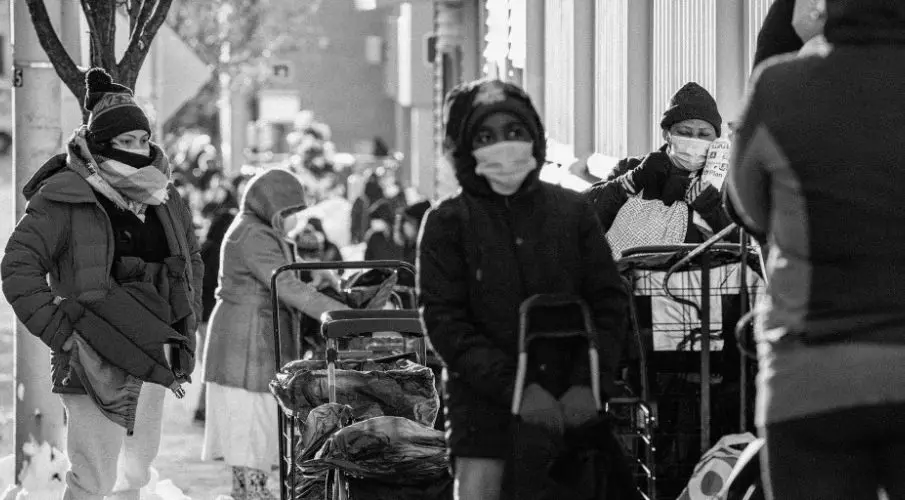Boston – Outside, rain beats down on the asphalt of Boston, inside a nation waits for a verdict. In the courtroom of the United States District Court for the District of Massachusetts, Judge Indira Talwani sits over files that will decide the lives of millions. It is about the SNAP program – the federal food assistance program on which more than 40 million Americans depend.
The Trump administration wants to stop the payments. The Department of Agriculture has announced that benefit cards will no longer be refilled as of November 1 – because the government allegedly has no money. For families who have to turn every dollar three times, that simply means no food. Yet on this evening in Boston, the political coldness behind this decision becomes tangible. Judge Talwani makes it unmistakably clear that poverty cannot simply be switched off just because the government is tangled in its own paralysis. “If you don’t have money, you tighten your belt,” she says. “But you don’t let everyone starve because there’s a political game going on somewhere.”
Twenty-five states, almost all Democratic-led, have sued Washington to keep the funding going. They demand that the government draw on existing emergency funds – around 5 billion dollars that were meant precisely for situations like this. The Trump administration refuses and hides behind formalities. Instead of taking responsibility, it invokes budget law – and leaves people without bread. Our investigation titled “The Deliberate Hunger Games – How Trump Denies the Poorest Their Bread” under the link: https://kaizen-blog.org/en/die-gewollten-hungerspiele-wie-trump-den-aermsten-das-brot-verweigert-eine-bedrueckende-investigative-recherche/ has already shown how deliberately this policy is pursued and that it violates existing law. It is no accident, it is intention: programs that help the poorest are systematically blocked to demonstrate political strength.
“It is hard for me to understand how this is not an emergency when there is no money and so many people rely on their SNAP benefits,” says Talwani. Her voice remains calm, but her words hit home. While Republicans like Senate Majority Leader John Thune block any compromise in Congress, individual states are trying to cushion the worst effects. In New Mexico, for example, Governor Michelle Lujan Grisham announced that she would provide 30 million dollars in state funds to ensure that families are not abandoned. “We will not let anyone go hungry just because Washington fails,” she said Wednesday in Albuquerque. In Illinois, Governor J. B. Pritzker has released 20 million USD in state funds to support food banks and help bridge the gap caused by the possible suspension of SNAP benefits as of November 1.
SNAP costs the United States about 8 billion dollars per month. It is not a luxury program but the backbone of social security. One in four children in the country depends directly or indirectly on it. When news broke in October that the payments were to be stopped, food banks reacted with shock. Their warehouses are emptying, the lines are getting longer, more and more people are standing outside in the cold at night. The plaintiffs warn that the loss of support will not only hit families but also schools, hospitals, and small stores. When parents go hungry, children learn less, illnesses increase, and local economies collapse. A family of four in 2025 may not earn more than 31,000 dollars net per year to qualify for SNAP. About two-thirds of recipients are families with children.

Judge Indira Talwani of the U.S. District Court for the District of Massachusetts took a firm stance against the Trump administration during a hearing on a class action filed by 22 Democratic attorneys general and three governors. She made it clear that the Department of Agriculture is obligated to tap into existing emergency funds for the SNAP program to continue providing food assistance to millions of Americans despite the ongoing government shutdown.
Talwani, appointed by Barack Obama, emphasized that she could not wait for Congress and must rely on existing law. Congress, she said, had explicitly outlined how to proceed in situations where appropriations are unavailable — and the administration must now “stretch” the funds that are already on hand. She rejected any legal maneuvering: “I want an agency action, not a lawyer’s tactic,” she said. With that, the judge signaled that she is seriously considering ordering the release of emergency funds to the states to prevent an interruption in food assistance starting Saturday.
Outside the Boston courthouse, hunger is no longer an abstract issue. It’s about life, about dignity, about what remains of a nation’s promise when it allows its own citizens to go hungry. Judge Indira Talwani is expected to issue her ruling within hours. (Boston, 11:20 p.m., October 30, 2025) — And for millions of people, everything depends on whether November will be empty, or whether America can remember, if only for a moment, that compassion is not a luxury.
To be continued .....
Investigative journalism requires courage, conviction – and your support.
Please also strengthen our journalistic fight against right-wing populism and human rights violations. We do not want to finance ourselves through a paywall so that everyone can read our research – regardless of income or origin. Thank you very much!


Wie kalt muss man sein um hungernde Kinder im eigenen Land als Druckmittel für die eigene politische Agenda zu missbrauchen?
Darüber verlieren die Medien hier kaum ein Wort.
Warum nicht?